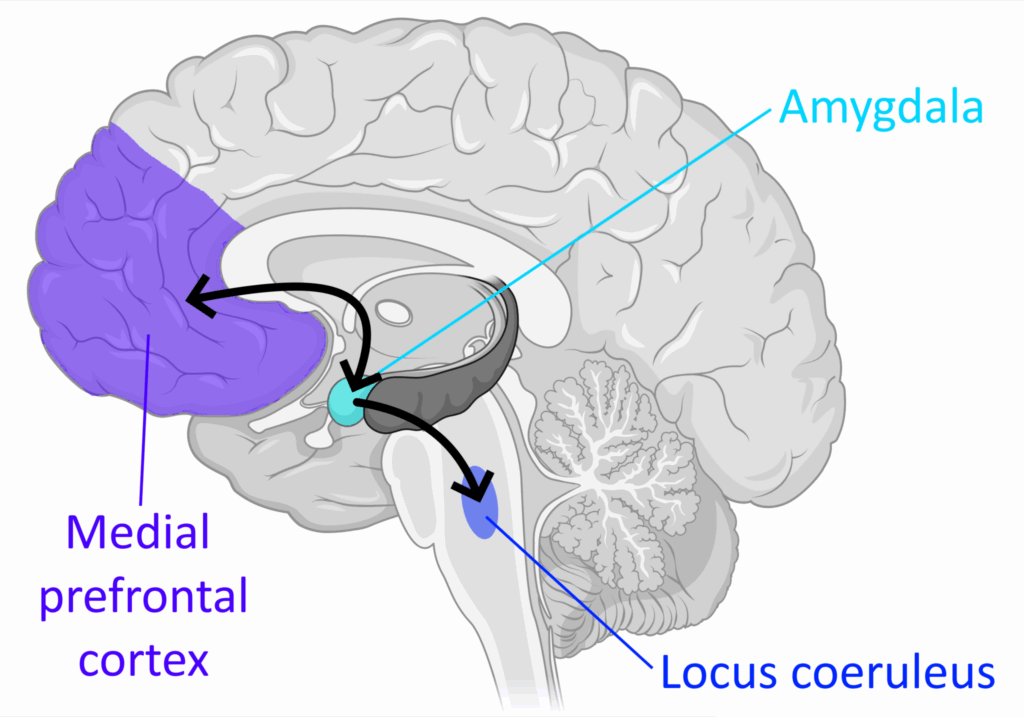Short answer
A bad night of sleep disrupts the brain’s emotional center, leading to higher sensitivity to stress and more difficulty regulating emotions.
Longer answer
On average, most people need between seven and eight hours of sleep per night to maintain mental and physical health. But we have all experienced not getting enough sleep and waking up tired and grumpy. Sleep deficiency is indeed linked to changes in mood, especially an increase in negative mood and a decrease in positive mood. When we don’t sleep enough, we tend to feel less happy and become more irritable and anxious.
Bad sleep turns up the negative feelings
Scientists have investigated how insufficient sleep tends to increase negative mood. Several studies have been performed on humans to investigate the effect of a lack of sleep – either by not sleeping for one whole night (called sleep deprivation) or by having reduced sleeping time over several days (called sleep debt). These participants were compared with a control group who slept the recommended seven to eight hours. Strikingly, in comparison to this control group, the group with a lack of sleep had significant changes in their mood and behavior. Just one night without sleep was enough to cause anxiety, anger and a depressed mood!
Lack of sleep makes the brain’s emotion center overactive
How could this work in the brain? To understand how sleep deprivation affects the brain, scientists use fMRI (functional magnetic resonance imaging), which is a technique which visualises oxygen use and blood flow in the brain to understand which brain regions are active. Using this technique, they discovered that one specific brain region becomes more active when faced with sleep deficit: the amygdala, which is involved in controlling emotions. This increased activity after a lack of sleep seems to be due to changes in the connections the amygdala makes with other brain regions. In particular, connections between the amygdala and the medial prefrontal cortex – a brain region involved in rational thinking and reasoning – appear to be weakened. Sleep deficit reduces the ability of the medial prefrontal cortex to ‘calm down’ the amygdala, making it harder to regulate emotions. On the other hand, connections between the amygdala and the locus coeruleus – a region also involved in emotion regulation – are strengthened after sleep deficit, possibly increasing the response to negative stimuli and worsening mood (see figure 1).

Figure 1: lack of sleep leads to changes in how certain brain regions connect with each other — especially the medial prefrontal cortex, the amygdala, and the locus coeruleus. When the connection between the medial prefrontal cortex and the amygdala becomes weaker (thin arrow), the amygdala becomes more active and its connection with the locus coeruleus becomes stronger (thick arrow). These changes help explain why lack of sleep can affect our mood and amplify negative emotions.
So far, no differences have been observed between females and males or across different life stages (children, adolescents and adults) on the effect of sleep deficit. However, most studies were done primarily on males, and few have examined both sexes. Since sleep deprivation may increase anxiety and depression more in females, further studies are needed to explore these potential sex differences in sleep deprivation and sleep debt.
Sleep recovery puts your brain back in balance
Interestingly, getting back to recommended sleep times after a period of sleep deficit normalizes amygdala activity and its connections with other brain regions, but this is mostly true after only a short period of bad sleep . Chronic or long-term sleep deficiency can increase the risk of chronic health problems, including physical issues like heart disease and diabetes, as well as mental health conditions such as depression and mood disorders.
Further Reading
[English] Yuki Motomura Y., Katsunuma R., Yoshimura M., Mishima K. (2017) Two Days’ Sleep Debt Causes Mood Decline During Resting State Via Diminished Amygdala-Prefrontal Connectivity, Sleep 40(10) DOI: 10.1093/sleep/zsx133
[English] Yoo S.-S., Gujar N., Hu P., Jolesz F.A., Walker M.P. (2007) The human emotional brain without sleep — a prefrontal amygdala disconnect, Current Biology 17(20) DOI: 10.1016/j.cub.2007.08.007
[English] Saghir Z, Syeda J N, Muhammad A S, et al. (2018) The Amygdala, Sleep Debt, Sleep Deprivation, and the Emotion of Anger: A Possible Connection?. Cureus 10(7): e2912. DOI: 10.7759/cureus.2912

